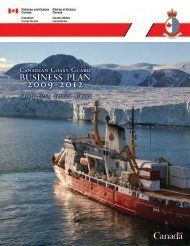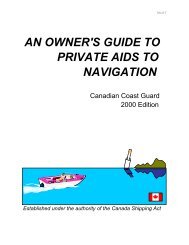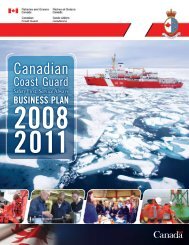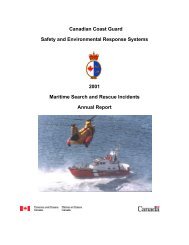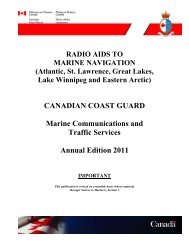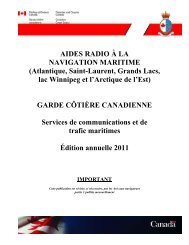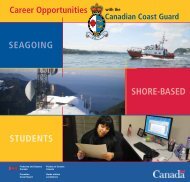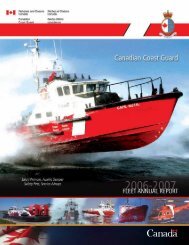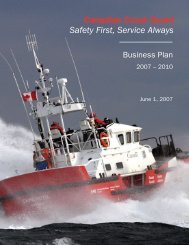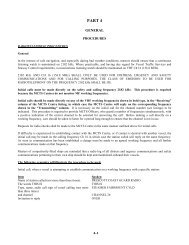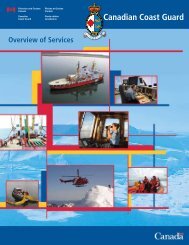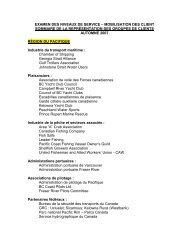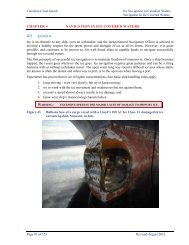RADIO AIDS TO MARINE NAVIGATION - Canadian Coast Guard
RADIO AIDS TO MARINE NAVIGATION - Canadian Coast Guard
RADIO AIDS TO MARINE NAVIGATION - Canadian Coast Guard
Create successful ePaper yourself
Turn your PDF publications into a flip-book with our unique Google optimized e-Paper software.
The information to be provided should be in accordance with the listing below:<br />
• vessel identification (boat’s name and licence number)<br />
• sail or power<br />
• vessel size and type<br />
• colour of hull, deck, and cabin<br />
• type of engines<br />
• other distinguishing features<br />
• radios and channels monitored (MF / HF / VHF;<br />
• Maritime Mobile Service Identity (MMSI)<br />
• satellite and/or cellular telephone number<br />
• description of life rafts or small boats available<br />
• number and type of flares<br />
• number of lifejackets, PFDs and/or survival suits<br />
• other safety equipment<br />
• name, address, and telephone number of vessel owner<br />
• other information<br />
• date and time of departure<br />
• number of people on board<br />
• departure point<br />
• route and stop-over points<br />
• destination<br />
• estimated date and time of arrival at destination, and<br />
• telephone number of an emergency contact person<br />
SEARCH AND RESCUE IN CANADIAN AREAS OF RESPONSIBILITY<br />
The <strong>Canadian</strong> Forces (CF) in co-operation with the <strong>Canadian</strong> <strong>Coast</strong> <strong>Guard</strong> (CCG) has overall responsibility for<br />
coordination of federal aeronautical and maritime Search and Rescue (SAR) activities in Canada, including <strong>Canadian</strong><br />
waters and the high seas off the coasts of Canada. The CF provides dedicated SAR aircraft in support to marine SAR<br />
incidents. The CCG coordinates maritime SAR activities within this area and provides dedicated maritime SAR vessels in<br />
strategic locations. Joint Rescue Coordination Centres (JRCC) are maintained at Victoria, BC, Trenton, ON and Halifax,<br />
NS These centres are staffed 24 hours a day by <strong>Canadian</strong> Forces and <strong>Canadian</strong> <strong>Coast</strong> <strong>Guard</strong> personnel. Each JRCC is<br />
responsible for an internationally agreed designated area known as a Search and Rescue Region (SRR). In addition,<br />
Maritime Rescue Sub-Centres (MRSC), staffed by <strong>Coast</strong> <strong>Guard</strong> personnel, are maintained at St. John's, NL and at Québec,<br />
QC to coordinate local marine SAR operations.<br />
JRCC VIC<strong>TO</strong>RIA<br />
Emergency telephone number<br />
JRCC TREN<strong>TO</strong>N<br />
Emergency telephone number<br />
1-800-567-5111 (Pacific Region only)<br />
250-363-2333<br />
250-363-2944 (facsimile)<br />
431699932 / 33 (telex - INMARSAT C)<br />
1-800-267-7270 (Central Canada only)<br />
613-965-3870<br />
613-965-7190 (facsimile)<br />
066-2282 (telex)<br />
431699928 / 29 (telex – INMARSAT C)<br />
<strong>Canadian</strong> <strong>Coast</strong> <strong>Guard</strong> Auxiliary<br />
The <strong>Canadian</strong> <strong>Coast</strong> <strong>Guard</strong> Auxiliary (CCGA) is an association of approximately 4500 dedicated volunteers operating<br />
close to 1300 vessels to support the <strong>Canadian</strong> <strong>Coast</strong> <strong>Guard</strong> in Marine Search and Rescue.<br />
For more information on maritime SAR services in Canada, refer to Section 28 of the Annual Edition of Notices to<br />
Mariners, published by the <strong>Canadian</strong> <strong>Coast</strong> <strong>Guard</strong>, Marine Navigation Services.<br />
4-37



